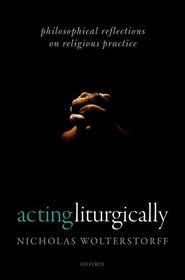
Acting Liturgically
Philosophical Reflections on Religious Practice
-
10% KEDVEZMÉNY?
- A kedvezmény csak az 'Értesítés a kedvenc témákról' hírlevelünk címzettjeinek rendeléseire érvényes.
- Kiadói listaár GBP 90.00
-
44 415 Ft (42 300 Ft + 5% áfa)
Az ár azért becsült, mert a rendelés pillanatában nem lehet pontosan tudni, hogy a beérkezéskor milyen lesz a forint árfolyama az adott termék eredeti devizájához képest. Ha a forint romlana, kissé többet, ha javulna, kissé kevesebbet kell majd fizetnie.
- Kedvezmény(ek) 10% (cc. 4 442 Ft off)
- Kedvezményes ár 39 974 Ft (38 070 Ft + 5% áfa)
Iratkozzon fel most és részesüljön kedvezőbb árainkból!
Feliratkozom
44 415 Ft

Beszerezhetőség
Megrendelésre a kiadó utánnyomja a könyvet. Rendelhető, de a szokásosnál kicsit lassabban érkezik meg.
Why don't you give exact delivery time?
A beszerzés időigényét az eddigi tapasztalatokra alapozva adjuk meg. Azért becsült, mert a terméket külföldről hozzuk be, így a kiadó kiszolgálásának pillanatnyi gyorsaságától is függ. A megadottnál gyorsabb és lassabb szállítás is elképzelhető, de mindent megteszünk, hogy Ön a lehető leghamarabb jusson hozzá a termékhez.
A termék adatai:
- Kiadó OUP Oxford
- Megjelenés dátuma 2018. március 22.
- ISBN 9780198805380
- Kötéstípus Keménykötés
- Terjedelem318 oldal
- Méret 242x165x30 mm
- Súly 570 g
- Nyelv angol 0
Kategóriák
Rövid leírás:
Participation in religious liturgies and rituals is a pervasive and complex human activity. This book discusses the nature of liturgical activity and the various dimensions of such activity. Nicholas Wolterstorff focuses on understanding what liturgical agents actually do and shows religious practice as a rich area for philosophical reflection.
TöbbHosszú leírás:
Participation in religious liturgies and rituals is a pervasive and remarkably complex form of human activity. This book opens with a discussion of the nature of liturgical activity and then explores various dimensions of such activity. Over the past fifty years there has been a remarkable surge of interest, within the analytic tradition of philosophy, in philosophy of religion. Most of what has been written by participants in this movement deals with one or another aspect of religious belief. Yet for most adherents of most religions, participation in the liturgies and rituals of their religion is at least as important as what they believe. One of the aims of this book is to call the attention of philosophers of religion to the importance of religious practice and to demonstrate how rich a topic this is for philosophical reflection. Another aim is to show liturgical scholars who are not philosophers that a philosophical approach to liturgy casts an illuminating light on the topic that supplements their own approach. Insofar as philosophers have written about liturgy, they have focused most of their attention on its formative and expressive functions. This book focuses instead on understanding what liturgical agents actually do. It is what they do that functions formatively or expressively. What they do is basic.
Philosophers of religion have classically engaged with topics such as God's existence and attributes, the problem of evil, and the question of miracles. Ritual, in contrast, has often been viewed as the preserve of religious studies scholars. In this dense but thoughtful collection based on work produced over several decades, Nicholas Wolterstorff corrects both of these assumptions by bringing strictly philosophical tools to bear on Christian liturgy. The Yale philosophical theologian attends to actions and texts, and in so doing endorses the turns to religious experience and to language that characterize contemporary philosophy of religion.
Tartalomjegyzék:
Introduction
PART ONE: LITURGY, ENACTMENTS, AND SCRIPTS
What is Liturgy?
On Following a Liturgical Script
With One Accord: The Communal Dimension of Liturgical Enactments
On Bended Knee: the Bodily Dimension of Liturgical Enactments
What Are Those without Faith Doing in Liturgical Enactments?
PART TWO: LITURGY AND SCRIPTURE
On the Liturgical Reading and Singing of Scripture
Liturgical Repetition and Reenactment
Liturgical Commemoration
The Liturgical Present Tense
PART THREE: GOD IN THE LITURGY
God's Liturgical Activity
Does God Know What We Say to God?
PART FOUR: LITURGY, LOVE, AND JUSTICE
Liturgical Love
Justice and Injustice in Christian Liturgies





